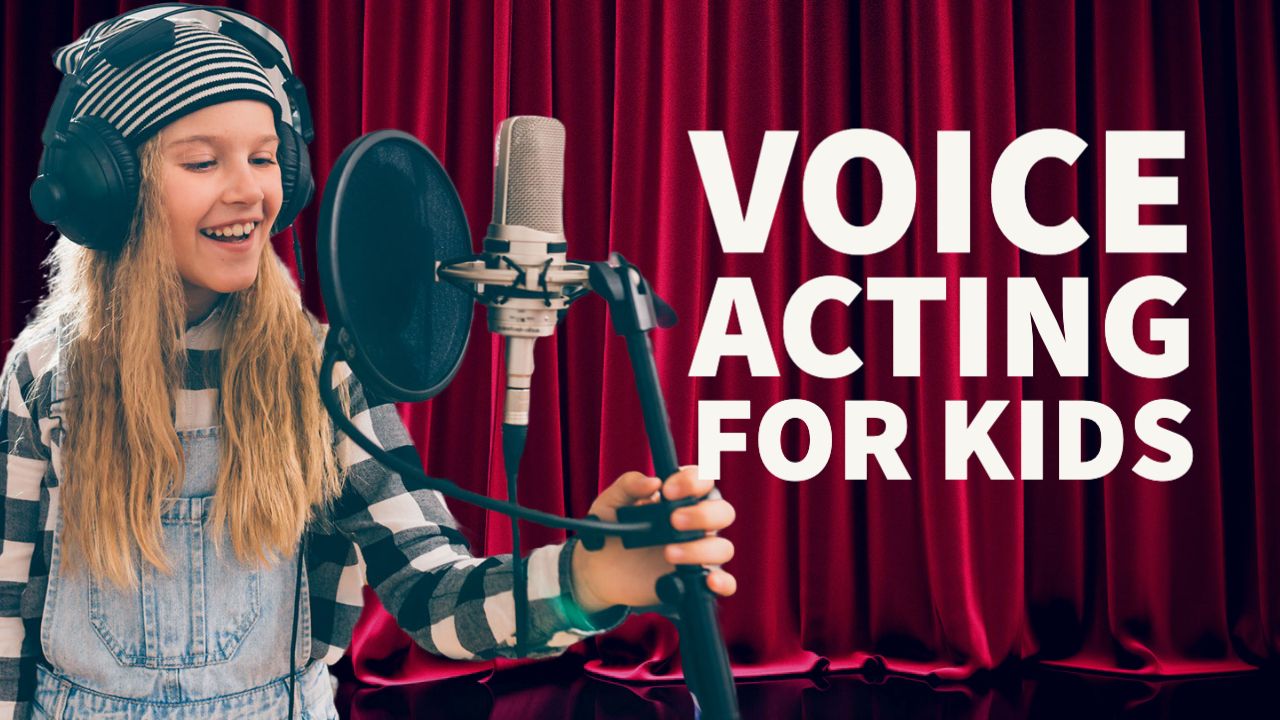Voice Acting for Kids: Here's Everything You Need to Know
Jul 26, 2023
Nowadays, voice acting isn't just for adults – it's a world that children can thrive in too! However, this has all changed. Lately, it’s become more and more clear that children aren’t just on the receiving end of animated tales, video games, or audiobooks – they’re instrumental in weaving these narratives too.
So, if you're a parent or guardian looking for new opportunities for your children – or if you’re a kid with a zest for performance and an innate ability to embody different characters – voice acting might be just what you need.
From getting started to landing your first voice acting gig and understanding the ins and outs of the business, let’s take a closer look at everything you need to know about voice acting for kids.

The Growing Demand for Kid Voice Actors
Today, we’re standing at the precipice of an industry that's growing faster than ever. And, as the demand for diverse content rises, so does the need for authentic voices to breathe life into characters. From the heroes of our favorite video games to the narrators of captivating audiobooks, they all have one thing in common: they need a voice actor to play the part.
This wave of demand, along with a rise in the popularity of animated content, has opened the doors for a younger generation of voice actors to fill seats that were once filled by… well, adults pretending to voice children.
However, in this new age, producers and directors prefer authenticity over imitation: they’re looking for genuine child voices, not adults modifying their tones to sound younger.
All of this means that the opportunities for child voice actors are expanding like never before. Whether it’s playing the lead role in an animated series, lending their voice to a supporting character on a video game, or even narrating a children’s audiobook, child voice actors are no longer confined to playing minor roles. Instead, they’ve become stars in their own way.
Why You Should Consider Voice Acting for Kids
With all this in mind, it’s clear that voice acting for kids is no longer a niche or something that would unexpectedly happen every once in a while. Instead, the career now offers a broad landscape that’s filled with opportunities to shine, grow, and create lasting impressions.
One of the most powerful reasons to consider voice acting for children is the different ways it can boost a child’s communication skills. By diving into the world of voice acting, children get to exercise their verbal and non-verbal communication muscles. When kids get into voice acting, they learn how to speak clearly and use different tones to bring the story (or a conversation) to life. Additionally, they come across new words in scripts, helping to grow their vocabulary, and they also learn how to change their voice pitch and tone to match the emotion of their character.
Basically, voice acting becomes a more in-depth and interactive way to polish their talking skills.

But this isn’t just about making your child a better speaker. Voice acting is also a big boost for a kid's self-esteem. Imagine standing in front of a microphone, bringing a character to life just by using their voice. That's pretty cool, right? After their first experience, voice acting gives them a sense of achievement and lifts their confidence. So, even outside of the studio, they feel ready to take on the world.
Last, but definitely not least, voice acting is a fantastic outlet for kids who love to get creative, enjoy making up stories, pretend to be different characters around the house, or like to play around with voices. Not only will voice acting provide them with a space where they can do this uninhibitedly, but it’ll also give them the freedom to put their own spin on characters and let their imagination really run wild.
At the end of the day, even if your child doesn't take up voice acting as a career, they can still learn tons of valuable skills that’ll be useful in the future: from school presentations to making new friends and future jobs, they’ll find a way to come handy.
Getting Started With Voice Acting for Kids
Venturing into the world of voice acting for kids involves a structured approach that’ll allow your child to cultivate their talent while also enjoying themselves and having fun. Kids don’t understand careers or work like adults – especially if they’re on the younger side – which means that getting started with voice acting shouldn’t be a matter of simply forcing them to read a script or participate in a project they’re not interested in.
Plus, pushing a child into voice acting when they don’t like the process could spell DOOM.
Nonetheless, if you and your child are eager to get started with voice acting for children, here’s a handy five-step guide to help you set the course in the right direction.
1. Assess Their Interest and Potential
As we mentioned above, before you can even think about jumping headfirst into voice acting, it's important to assess your child's interest in the field. The concept itself should evoke a sense of excitement and curiosity, and it should never be perceived as a boring task.
That said, a great way to gauge interest is to encourage your child to experiment with different voices, replicate dialogues from their favorite cartoons, or even narrate a story using varied tones. This initial phase of exploration and testing can be a clear indicator of their enthusiasm toward voice acting.

2. Sign Them Up for Vocal Training
Contrary to popular belief, voice acting for children isn't just about owning an adorable voice – it's an art that requires an understanding of vocal nuances, breath control, clear articulation, and an ability to vary tone and inflection.
When it comes to getting your child started, finding online and in-person voice acting lessons for kids can help provide a structured approach to mastering these elements.
Professional voice coaches, equipped with the additional knowledge of child education and voice techniques, can help refine your child's skills, encourage them to explore their vocal range, understand rhythm and pacing, and even build character voices effectively. All of which can then establish a solid foundation for their voice-acting journey.
At A VO’s Journey, we have different voice acting courses that can help both children and their parents learn more about the world of voice acting, hone in on their skills, and master their craft. Whether it’s from a 1-on-1 perspective or a masterclass on Conversational Tone Voice Acting, we’ll provide you with a toolbox to help further your career.
3. Create a Demo Reel
In short, a demo reel is similar to a voice actor's resume. This audio recording captures your child's voice acting talents across different vocal styles, emotions, and character personas.
When creating a demo reel, it’s important to note that it should encapsulate the diversity and adaptability of your child's voice, making it a powerful tool to showcase their talent. That’s why diversity is key!
Make sure you incorporate segments that highlight your child's ability to switch from a giggling gnome to a stern superhero, and that it includes sound bites where your child expresses excitement, sadness, or suspense and varies the pace and pitch of their speech. This comprehensive collection of moods, voices, and tones can be a game-changer when it comes to impressing casting directors and landing auditions.
4. Find Professional Representation
Navigating the voice acting industry can be overwhelming – especially when there’s a minor involved. This is where a talent agent or specialist can be your ally.
An agent with experience in children's voice acting can not only guide you through industry protocols, but they’ll also work to ensure fair contracts and direct your child toward suitable auditions. Plus, they can also provide valuable insights into industry trends and demands, all of which will give your child the upper hand and help them adapt their skills accordingly.
Remember, finding the right agent is a blend of their expertise and your comfort with them. So, take your time, research well, and choose an agent that aligns with your child's aspirations and your own expectations.

5. Ready, Set… Audition!
With the demo reel ready and an agent by your side, the next step is to face auditions. Auditioning can be nerve-wracking, sure, but it's also a platform for your child to express their talent and embrace new opportunities.
Before the audition phase, speak to and encourage your child to approach each audition with enthusiasm, readiness to learn, and resilience. You know what they say: the road to success is paved with perseverance.
Each audition, no matter the outcome, will help contribute to your child's growth as a voice actor. That’s why it’s so important to celebrate their efforts and nurture a positive outlook toward auditioning – instilling in them the resilience needed for a successful career in voice acting.
At the end of the day, entering the world of voice acting for kids is a thrilling journey filled with learning, creativity, and growth. And there’s no doubt that each stage of this journey can bring forth new opportunities and experiences that contribute to your child's development – both as a voice actor and an individual.
So with the right approach and persistent efforts, your child can soar in this fascinating realm of voice acting.

Our Top Tips for Success
Did you think we were done? Not even close! Getting started with the voice acting journey is just the beginning, and sustained success requires a strategic and consistent approach.
What else could you possibly do to help your child once they realize voice acting is their calling? Here are five additional tips to boost your child's progress and their confidence as they venture deeper into the world of voice acting:
1. Practice, Practice, Practice
Repetition is the key to mastering any skill, and voice acting is no exception. Regular practice can significantly enhance your child's familiarity and comfort with their voice and its capabilities, so encourage them to experiment with different characters, tones, and emotions.
Use everyday opportunities like reading a bedtime story or recreating a scene from their favorite cartoon for impromptu practice sessions to this. You’ll soon start to notice that these activities not only refine their voice acting skills but also make the learning process enjoyable and engaging.
2. Never Skip a Warm-Up
Voice acting relies heavily on the vocal cords, and just like any muscle, they need to be adequately warmed up before any performance. Once your child is voice acting more frequently, incorporate a variety of vocal exercises into your child's routine, like humming, lip trills, or simple scales to help prepare their voice for acting. Tongue twisters can also be fun and effective exercises for improving diction and speed.
Additionally, deep breathing exercises can help in managing breath control – a crucial aspect of voice acting. Making sure to properly warm up your child’s vocal cords won’t just enhance their performance but also protect them from undue strain.
3. Voice Care is Essential
In line with the above, it’s important to note that children's vocal cords are sensitive and need to be taken care of very carefully. That said, it’s important to note that, while allowing your child to live out their dream of playing a cartoon is great, encouraging regular voice rest periods – particularly after extensive practice sessions or performances – is also a must.
Discourage habits that may strain their vocal cords, such as yelling, screaming, or attempting extremely high or low pitches without proper training, and always make sure that your child understands the importance of vocal health and sticks to practices that promote it.
4. Stay Patient, Keep Your Cool
Voice acting, especially for children, is a journey of growth and learning that unfolds over time. Success doesn't happen overnight, and it's important to instill a sense of patience and resilience in your child (and, let’s be honest… in yourself too).
Celebrate small victories – like mastering a new character voice or receiving positive feedback at an audition – and remind your child that every effort they make is a small step that will add to their progress.
5. Remember to Have Fun
The world of voice acting opens a portal to endless creativity and imagination for a child. And, while discipline and persistence are important, the process should primarily be enjoyable and stimulating.
Allow your child to experiment with their voices, impersonate their favorite characters, and express their unique creative visions – even when it’s not part of the role or audition prep. When a child is having fun, they're more engaged, motivated, and open to learning; emphasizing this enjoyment will help their interest alive and ensure that voice acting remains a source of joy and not something they can’t wait to leave behind.
Voice Acting for Kids is a Marathon, Not a Sprint
More than securing jobs, voice acting for kids offers a unique opportunity to enhance communication skills, boost confidence, and provide a creative outlet. So, whether your child is aspiring to be the next big cartoon voice or just looking to have fun and learn new skills, voice acting for kids can be a truly rewarding experience.

However, like any journey, success hinges on consistency, understanding audiences, and effective message delivery. But don’t worry – this sounds a lot harder than it needs to be. With the right mindset and approach, your child can find his spark and light up the world of voice acting in no time.
So, why wait? The thrilling journey of voice acting for kids starts now!






